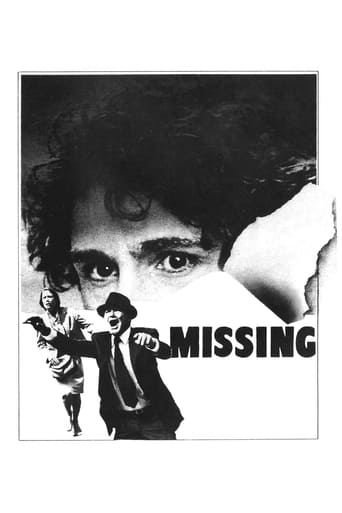tomgillespie2002
The Hollywood debut of Greek director Costa-Gavras caused quite a stir when it was released in 1982. Based on a true story, Missing is a damning condemnation of U.S. foreign policy, criticising their efforts to locate missing American citizen Charles Horman (John Shea) when he goes missing in 1973 Chile, as well as suggesting their direct involvement. The country had just experienced a military coup, and the new leaders have declared martial law, placing a curfew on the population under threat of death. The sound of machine-gun fire is commonplace, as are military raids on homes and the disappearance of thousands of citizens. Worst of all, bodies litter the streets, watched over by dead-eyed soldiers who seem to do as they please. Charles, a left-wing writer, has simply vanished, sucked up into a system of brutality. And nobody seems eager to find him.We're with Charles for a long period before his disappearance, and Costa-Gavras keeps us just as much in the dark as his wife Beth (Sissy Spacek) and father Ed (Jack Lemmon), the latter arriving frustrated with the little progress his daughter-in-law has made. Their ideologies clash almost immediately. Beth is very much on board with her husband's politics, while Ed is a devout Christian scientist with complete trust in his country's Embassy's desire to locate a fellow citizen. The performances are genuine and heartfelt. The characters themselves are recognisable and relatable in an otherwise terrifyingly alien, oppressive world, which serves as a wake-up call to Ed, who would otherwise be eating breakfast at home oblivious to the plight of Chile's people. The most powerful moments of Missing involve Ed battling his way through waves of bureaucracy and the empty promises of diplomats.Costa-Gavras manages to build an atmosphere of relentless tension in a place where failing to find yourself a taxi to make it home in time for the curfew could see you dragged away for execution. Yet this is built around Ed and Beth's difficult relationship, and the film emerges and ultimately triumphs as a thoroughly engaging character study rather than a political thriller. Tiny, throwaway moments hammer their struggle and mental anguish home, particularly a moment where Ed descends a set of stairs and, without realising it, starts to ascend the one opposite. It takes a moment before he realises, shakes his head, and turns around, and you really feel for the guy. Costa-Gavras deliberately infuses Missing with a sense of timelessness, failing to confirm the story's year and location, introducing the idea that this could be happening anywhere, at any time. Coups and dictators come and go, and the people suffer for it. Those who choose to ignore it may eventually become the cause.
GrigoryGirl
I watched this film when I was younger and loved it. Seeing it again after many years, it's still riveting, but it has flaws in it, mainly the motivations of Charles, the man who goes missing. Why was he killed so indiscriminately? It was a pretty well known fact that the CIA and the US were behind the 9/11/73 (yes, the Chilean coup happened on Sept. 11th), and as far as the movie goes, Charles was never threatening to expose what was happening. There's even a NY Times reporter in the movie covering the coup, and she's never messed with. Plus there was a coup attempt a few months prior to the September one, and it (obviously) failed. The country was also in turmoil during the Allende years (lots of strikes, some local, some manufactured by the Americans), so the portrayal of Charles as a naive idealist strikes as false. Plus 2 other men who write for a left wing publication that Charles does are arrested, one is executed, the other is set free. So why was Charles considered such a threat? The movie never really explains.Lemmon's character naivete works well (and it's one of his best performances). He's just a man who is looking for his son, and is outraged not only about his son and his son's fate, but of the sheer brutality (very well depicted in the movie) carried about by the coup leaders with backing from the US. Lemmon is a very proud American, so his beliefs are pretty much shot to hell by the end of the film, which shows the ugly side of US foreign policy. The official run around is in full swing and Lemmon's gets more and more infuriated at the lies and obfuscation of the US officials, and then it turns to fury as he discovers his son's fate.A flawed but still great movie. As a man looking for his son, the film works wonders thanks to Lemmon and Spacek. As a political thriller, it works less well.
bkoganbing
Growing up in the Fifties as the USA hunkered down in the Cold War it was a nostrum repeated to us time and again that no country ever chose Communism by a democratic election. When the people of Chile elected Marxist Salvador Allende with a plurality of the vote that could no longer be said. But for the USA Allende maybe because he was elected and not part of a coup he was like an aberration that had to be expunged one way or another. In the world of geopolitics Chile would be quite a prize for the other side. It's one of the leading suppliers of copper and probably the leading supplier to the world of nitrates. Can't let that country go red.So with this in mind our Central Intelligence Agency directed a military coup against Allende who either committed suicide or was murdered by those who rose against him. A very brutal dictator named Augusto Pinochet took over and his reprisals were long and bloody. Sometimes they extended to foreigners as they did in Missing.The story of Missing concerns the father and the wife of the missing John Shea who was a free lance journalist who like so many simply vanished when it was known he was an opponent of the regime. John Shea is seen at the beginning of Missing and he's a guy who hasn't quite settled down and thinking maybe this free lance journalism is what I'm meant for, finally. He fails to listen to the advice a few friends to be more discreet and not so obviously noting down the answers people give him.When he goes missing his father played by Jack Lemmon comes down from America and joins Sissy Spacek who is Shea's wife. Father and daughter-in-law search everywhere and are given nothing but stonewalling answers from the Chileans and the American officials on the scene. What Shea's cardinal sin was the discovery of those unofficial Americans on the scene, mostly of military background which contrasts the official line that America had not a thing to do with Allende's overthrow. Lemmon and Spacek got Oscar nominations for Best Actor and Best Actress for Missing. Lemmon who most people identify with as a comic actor kept surprising us his entire life with dramatic performances that were special. The politics of Missing are diverted when Lemmon is on and we concentrate on a father's overwhelming grief and confusion over the fate of his son. He knows the worst has happened, that's confirmed by all he sees. Yet Lemmon's expressions tell all and the same could be said for Sissy Spacek.Missing was also up for Best Picture and did win an Oscar for Best Adapted Screenplay. It was up that year against the grand pageantry of Gandhi as were a few other worthwhile films. Missing is one unsavory story that should be told and retold.
dougdoepke
There's a particularly chilling scene in this movie. It comes near the end in a confrontation between Charles Horman (Jack Lemmon) and staff members of the American ambassador in post-coup Chile, 1973. To this point the staff has sounded polished and professional in their concern for Horman's missing son, an apparent casualty of the coup. But in this scene the devious reality of American policy begins to emerge from behind the velvet glove, and Horman's passage from credulous liberal to disillusioned skeptic is complete. In a nutshell, the scene symbolizes one of the great divides in American political life, between the polished propaganda face our government presents to the people and the grim realities that face covers over, especially in dealing with Third World countries like Chile. Horman represents the frustration many feel in trying to deal with a cosmetic facade supported by both major political parties, when beneath it crouches the murderous policies of imperial rule.The real question the film poses is what Horman will do upon returning home.The film itself remains a gripping eyeopener from first to last. Costa-Gravas is especially good at recreating the abject terror of fascist rule: where long hair is forbidden and women are forced back into skirts, where people are present one minute and gone the next, where a democratically elected government is present one minute and gone the next, and where a Henry Kissinger can do the behind-the-scenes dirty work and be honored for it (not in the movie, but true nevertheless). The acting is first-rate, and a tour-de-force for Lemmon in particular. Ditto, the often overlooked Charles Cioffi who puts the real chill in the confrontation scene. Two complaints: the arch symbolism of the riderless white horse conflicts with Costa-Gravas's documentary approach, and why, oh why, did they have to make Horman's son so cuddly. The audience gets the point without spooning on the sugar. Anyhow, this remains a fine piece of revelatory film-making and retains as much relevancy for today's audience as it did twenty years ago.


 AD
AD



